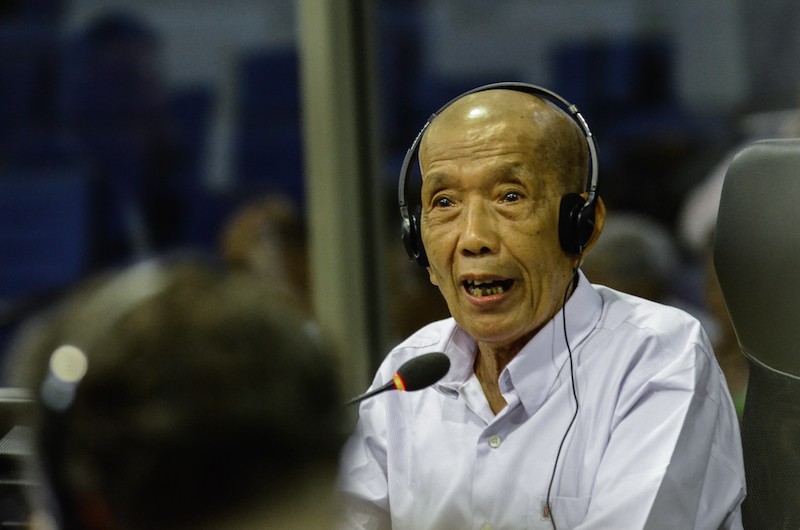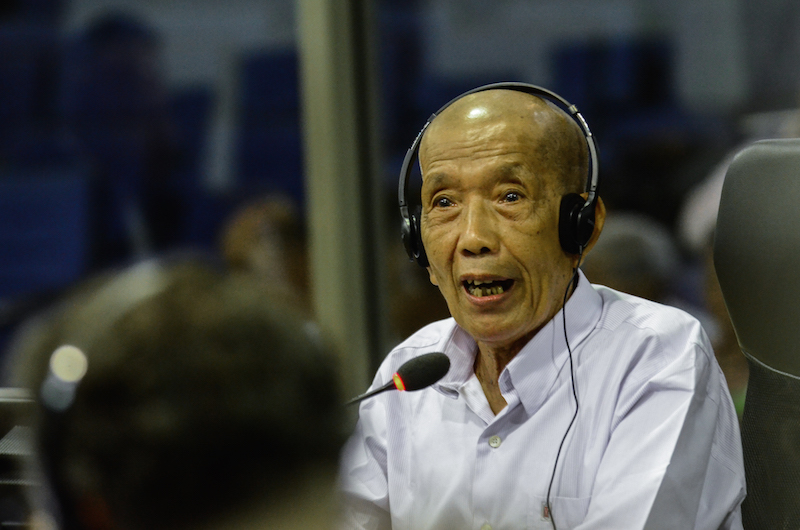Facing Trial Chamber President Nil Nonn with an almost startled stare on Monday morning, Kaing Guek Eav glanced left, stood up and silently exited the Khmer Rouge tribunal’s courtroom for what will almost certainly be the last time.
It brought an end to a marathon 12 days of testimony from the former prison chief, better known by his revolutionary alias Duch, more than four years since he last took the stand in the first trial against Khmer Rouge second-in-command Nuon Chea and head of state Khieu Samphan. Seven years has passed since the start of Duch’s own trial, which resulted in his being sentenced to life in prison for war crimes and crimes against humanity.

Returning to the court noticeably frailer than when he was last seen in public—and with his gray hair shaved off—it did not take long for the former warden to begin recounting the atrocities committed under his watch at S-21, where more than 15,000 people are thought to have been sent to their deaths.
And he wasted no time in pointing the finger at “Uncle Nuon” for his role in the crimes.
“I am surprised by the denial by Uncle Nuon,” Duch said on day one of his testimony, when asked by assistant prosecutor Dale Lysak about Nuon Chea’s claim that, as Pol Pot’s deputy, he had “never been responsible” for crimes at S-21.
“Everybody had to respect the principles of the party, decided by the party secretary and the deputy secretary of the party. That is the line of organization of the party, so his denial is nonsense,” Duch said.
This would set the tone for the rest of Duch’s testimony. The prison chief laid blame at the feet of Nuon Chea for numerous crimes, including ordering four Westerners to “be burned to ash” and entire families of purged cadre to be “smashed.”
In a trial where prosecutors have struggled to draw direct links between crimes committed on the ground and decisions made by the regime’s upper echelons, Duch repeatedly spoke of reporting to Nuon Chea and carrying out his orders. Though his testimony against Khieu Samphan was spare, Duch scoffed at claims that the head of state knew nothing of the mass purges carried out by the Khmer Rouge.
Despite his physical state, Duch remained animated and focused in the courtroom. While at times giving deep and considered—if sometimes convoluted—replies, he could also be short and combative when pressed by defense lawyers.
Despite covering plenty of well-trodden ground—the systematic killing machine that was S-21 and the regime’s strict chain of command—Mr. Lysak said Duch’s testimony was a “necessary and a critical moment” in the trial that brought significant new evidence.
“I also thought it was quite significant…that the head of the CPK [Communist Party of Kampuchea] security apparatus dismissed as implausible the Nuon Chea Defence’s conspiracy and coup theories,” he said in an email.
“It was Duch’s job as head of S-21 to identify possible security threats to the regime, and he was able to see fairly quickly that the names and details in the conspiracy snippets put to him by the Defence simply did not add up.”
This notion was refuted by Nuon Chea’s lawyer Victor Koppe, who engaged in a number of heated exchanges with Duch, accusing the prison chief of attempting to sabotage his client’s case and intentionally deceiving the court.
“Well, he was deliberately trying not to answer my questions on the rebellion and factions. And the [Trial Chamber] let him get away with it. Of course he knew about the coup d’etat plans of Koy Thuon and others. It’s all there in the confessions,” Mr. Koppe said in an email, refering to the North Zone commander who gave a forced confession to S-21 interrogators before meeting his death at the prison.
Craig Etcheson, who served as chief of investigations in the Office of the Co-Prosecutors at the tribunal for six years, said that despite his admissions, Duch’s testimony, in all three trials, had shed little new light on crimes committed by the regime.
“[O]ne notable exception has been his descriptions of various conversations he says that he had with senior Khmer Rouge leaders, including [Defense Minister] Son Sen, Nuon Chea and Khieu Samphan,” Mr. Etcheson said in an email.
“These descriptions have provided a window into the inner workings of the regime which has otherwise been unavailable,” he said.
Unlike other mid-ranking cadre—who have appeared evasive and cagey when presented with evidence linking them to crimes—Duch was relatively cooperative and candid throughout the three trials, admitting to heinous crimes and offering apologies.
Thierry Cruvellier, a French journalist who authored “The Master of Confessions” after covering Duch’s trial, said that although it would be “presumptuous” to attempt to analyze Duch’s mindset, he believed there was likely a level of calculation to his honesty.
“What has always been troubling in the case of Duch is that he essentially admitted his crimes from the very moment he was identified in 1999. This would support the idea that, to some extent, his admission of guilt brought him some measure of personal relief,” Mr. Cruvellier said in an email.
Having covered all contemporary international tribunals for war crimes and crimes against humanity, Mr. Cruvellier said Duch was exceptional in having had access to the Khmer Rouge leadership.
“Compared to many war criminals who confessed his crimes in contemporary war crimes tribunals, Duch was rather unique in the detailed knowledge he had of the terror system he had served and his direct access to several top members of the regime,” he said. “He also had the intellect to understand and analyze the ideology he had embraced.”
“As much as this is possible for someone who has never been caught in the historical circumstances of 1970’s Cambodia, and who was not born into Khmer culture, I would say that Duch did provide a rare insight of how we, human beings, function when caught into mass murder,” he added.
Bou Meng, who was jailed at S-21, but kept alive due to his ability to paint portraits of Pol Pot, said he did not believe that Duch felt sorry for the horrors he oversaw.
“It doesn’t matter that he has admitted to more crimes than other former Khmer Rouge leaders. I still cannot trust that he feels true remorse,” he said.
Youk Chhang, director of the Documentation Center of Cambodia, said he believed Duch’s honesty was born of the hope that he would one day walk free.
“Duch has admitted so much, collaborated so much, shared so much because they are the legal conditions to reduce his sentence and he perhaps has been hoping he can reach to a point [of] becoming free,” Mr. Chhang said in an email.
“I wish the court [would] order him to read all the confessions at S-21 until he dies.”
(Additional reporting by Kuch Naren)




